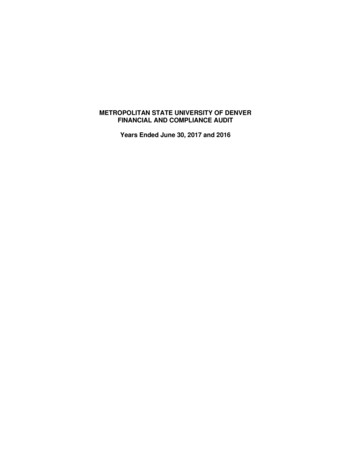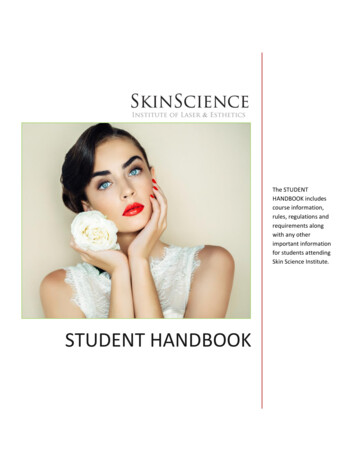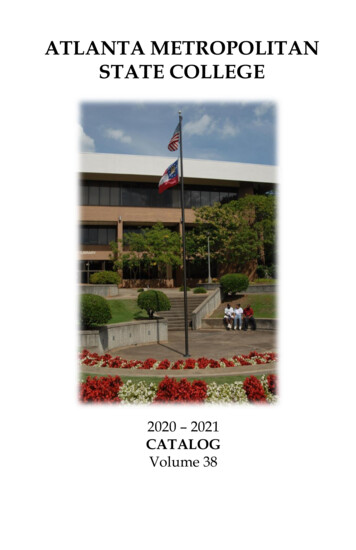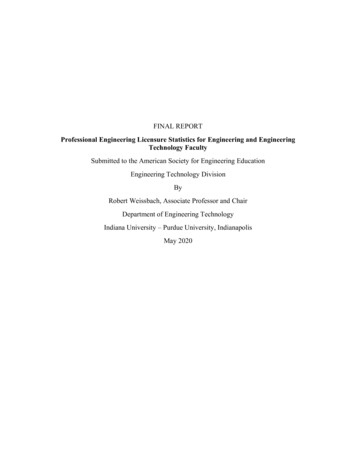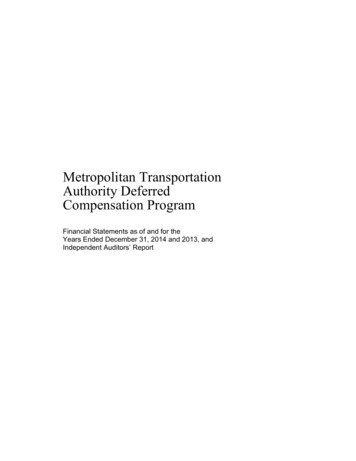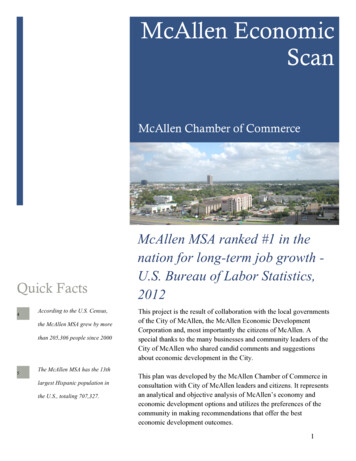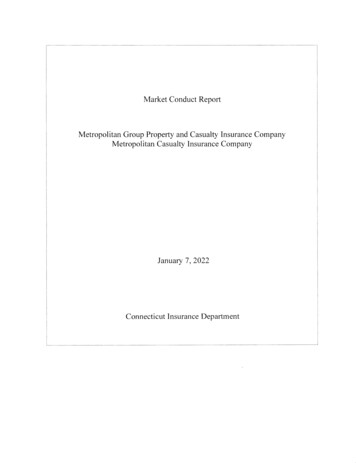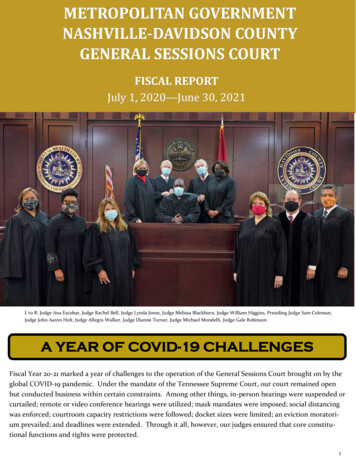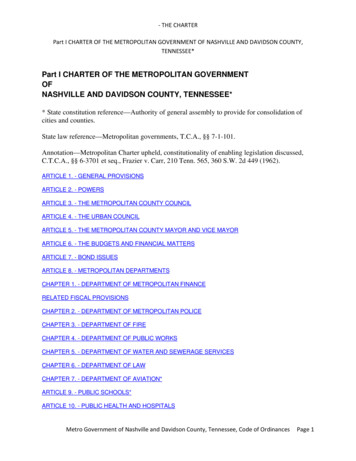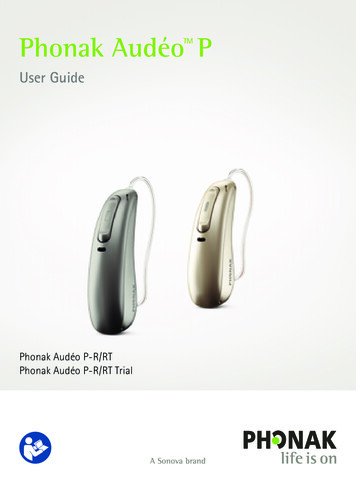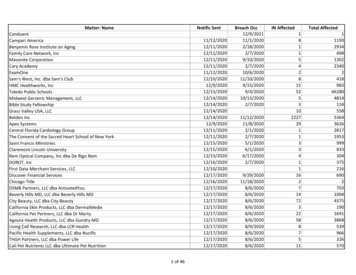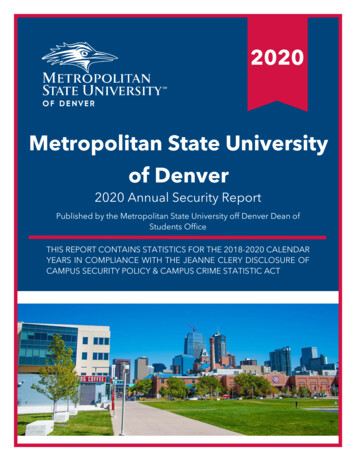
Transcription
2020Metropolitan State Universityof Denver2020 Annual Security ReportPublished by the Metropolitan State University off Denver Dean ofStudents OfficeTHIS REPORT CONTAINS STATISTICS FOR THE 2018-2020 CALENDARYEARS IN COMPLIANCE WITH THE JEANNE CLERY DISCLOSURE OFCAMPUS SECURITY POLICY & CAMPUS CRIME STATISTIC ACT
METROPOLITAN STATE UNIVERSITY OF DENVER 2020 ANNUAL SECURITY REPORTTable of ContentsThe Clery Act . 4Preparation of the Annual Security Report. 4Reporting Crimes & Emergencies . 5MSU Denver Dean of Students Office & Student Care Center . 5Auraria Campus Police Department . 6Voluntary & Confidential Reporting. 6Confidential Reporting – Pastoral & Professional Counselors . 7Security of & Access to Campus Facilities . 7Law Enforcement & Jurisdiction . 8Authority to Arrest & Relationships . 8Accurate & Prompt Reporting . 9Monitoring Campus Student Organizations. 9Crisis Communications Plan . 10Issuance of a Timely Warning Advisory. 10RAVE Emergency Notifications . 11Emergency Drills, Testing, & Evacuation . 11Programs to Prevent Dating Violence, Domestic Violence, Sexual Assault, &Stalking . 12Colorado State Statutes . 12Descriptions of Program Types . 14MSU Denver Policies Related to Sexual Misconduct . 20Procedures After Experiencing Violence . 30Written Notification of Resources . 30Importance of Preserving Evidence. 30How and to Whom to Report or Refer . 312
METROPOLITAN STATE UNIVERSITY OF DENVER 2020 ANNUAL SECURITY REPORTOptions to Involve Law Enforcement & Campus Authorities . 32No Contact Directives, Protection Orders, & Restraining Orders. 32Confidentiality . 33Sex Offender Registration Information . 33Investigative & Disciplinary Procedures for Sexual Misconduct . 34Responsible Offices for Conducting Investigations . 36Investigative & Disciplinary Proceedings . 36Office of Equal Opportunity/Title IX Coordinator’s Title IX Procedures .37Student Code of Conduct . 43Standard of Evidence . 47Potential Resolutions from Investigative & Disciplinary Proceedings . 47Disclosure of Results of Investigative & Disciplinary Proceedings . 48Security Awareness & Crime Prevention Programs . 49Drug, Alcohol, & Substance Misuse/Abuse . 51Health Risks Associated with Drug, Alcohol, & Substance Misuse . 51Drug and Alcohol Counseling, Treatment or Rehabilitation, or Re-entryPrograms . 53Laws & Policies Related to Drug, Alcohol, & Substance Possession or Use . 54Alcohol Laws & Policies . 56Drug Laws & Policies . 57Annual Fire Safety Report . 66Missing Student Notification . 66Definitions of Clery Reported Crimes . 66Annual Crime Statistics. 693
METROPOLITAN STATE UNIVERSITY OF DENVER 2020 ANNUAL SECURITY REPORTThe Clery Act - BackgroundAfter their daughter, Jeanne Clery, was raped and murdered in her college residence hall atLehigh University in 1986, Conne and Howard Clery advocated for legislation to be passed thatwould require universities to disclose information about crimes on college campuses. Their goalwas to create safe communities where individuals had all the information needed to makeinformed decisions regarding safety. Their efforts helped pass the federal Crime Awareness andCampus Security Act in 1990 and later renamed in honor of their daughter, the Jeanne CleryDisclosure of Campus Security Policy and Campus Crime Statistics Act. Today it is morecommonly known as the Clery Act.Preparation of the Annual Scurity ReportMetropolitan State University of Denver (MSU Denver) values transparency and promoting aninformed, safe community. The following policies, statistics, and resource information providedin compliance with the Clery Act are for community members to make informed decisionsregarding their safety.This report is prepared by the Compliance and Prevention Coordinator in the Dean of StudentsOffice of MSU Denver in cooperation with the Auraria Higher Education Center (AHEC),Auraria Campus Police Department (ACPD), and local law enforcement agencies surroundingthe Auraria Campus and extended campus locations. The Dean of Students Office annuallyreviews the policies outlined in this report with relevant campus departments such as the Officeof Equal Opportunity (OEO) and General Counsel. The Dean of Students Office reviewsstatistics of crimes reported to the institution and requests the same information from the ACPDand relevant local law agencies to compile the statistics listed.4
METROPOLITAN STATE UNIVERSITY OF DENVER 2020 ANNUAL SECURITY REPORTReporting Crimes & EmergenciesCrime reports can be made at any time. To report a crime, contact the MSU Denver Dean ofStudents Office, Student Care Center, or the ACPD.MSU Denver Dean of Students Office &Student Care CenterMSU Denver cares about keeping our campus community safe and supported through difficulttimes. There are multiple modes in which students, faculty, staff, and community members canreport a crime to the institution. If an emergency requires immediate attention, MSU Denverencourages community members to report to the ACPD or local law authority.In addition to campus law enforcement, under the Clery Act, some University employees whohave responsibility for campus security or significant responsibility for student and campusactivities are designated as Campus Security Authorities (CSAs). CSAs are required to reportany information they have regarding applicable crimes on or adjacent to campus to the institutionfor response, support, and inclusion of information in the Annual Security Report.A person experiencing or have experienced a crime can utilize the referral methods listed belowfor the Dean of Students Office and Student Care Center or contact a CSA to report on theirbehalf. Examples of CSAs at MSU Denver include: Dean of StudentsDirector of AthleticsTeam CoachFaculty Advisor to a Student GroupStudent Care Center Case ManagerTo report to the Dean of Students Office an alleged crime that violates the Student Code ofConduct, an Incident Report can be completed. An Incident Report can also be accessed on theDean of Students website at ort-an-incident/For any concerned party to share information about a student of concern a CARE Referral can bemade. The Student Care Center case managers provide one-on-one support and resources. ACARE Referral can also be accessed on the Student Care Center website atmsudenver.edu/student-care-center/5
METROPOLITAN STATE UNIVERSITY OF DENVER 2020 ANNUAL SECURITY REPORTAuraria Campus Police DepartmentACPD services are available 24 hours a day, seven days a week to respond to the AurariaCampus. Priority is given to reports of incidents that threaten the life or safety of people, thesecurity of property and the peace of the community. ACPD can be contacted for a report viaemergency boxes or red poles on campus or online at rime-report-form.Colorado Revised Statutes, 18-8-115, “Duty to Report a Crime,” requires all persons who believea crime has been committed to promptly report the suspected crime to law enforcementauthorities. When on campus, these crimes must be reported to ACPD. To report a crime, useone of the emergency telephones located in every classroom building for immediate, directaccess; or call 911 from any campus phone for emergencies or call 303-556-5000 for otherpolice assistance. Cell phones and off-campus calls dial 303-556-5000. Messages can also besent via the Text-a-Tip line at 720-593-TIPS (8477).In addition, those with protection orders against another party are strongly encouraged to notifythe ACPD of the threat and provide the ACPD a copy of the protection order so that AurariaOfficers may enforce it. If the other party is restrained from the Auraria Campus, please have thecourt list MSU Denver and AHEC separately on the order.Voluntary & Confidential ReportingThose experiencing or who have experienced a crime have the option to voluntarily report theirexperience. Reported crimes are included in annual crime statistics, however, details regardingthe crime or those affected is kept confidential.Crimes can be reported to a CSA, the Dean of Students Office through an Incident Report, theStudent Care Center through a CARE Referral, or the ACPD via an Anonymous ReportingOption for those who do not wish to be identified. If the crime poses an ongoing threat to thecampus it is preferred to report to the ACPD and Dean of Students Office.If a serious crime that may cause an ongoing threat to the campus is reported to a CSA, they areto directly report that incident to the ACPD immediately. MSU Denver has a responsibility tonotify the campus community about any crimes which pose an ongoing threat to the community.As such, a CSA is obligated by law to report crimes with an ongoing threat immediately to theACPD.6
METROPOLITAN STATE UNIVERSITY OF DENVER 2020 ANNUAL SECURITY REPORTConfidential Reporting – Pastoral &Professional CounselorsPastoral and professional counselors or psychiatrists are not considered CSAs under the CleryAct and can provide confidential assistance to those they are counseling. MSU Denver does notcurrently have any pastoral counselors.A professional counselor or psychiatrist is an employee of MSU Denver whose officialresponsibilities include providing mental health counseling to members of the MSU Denvercommunity and who is functioning within the scope of their counseling license or certification.Professional counselors or psychiatrists are encouraged, if and when they deem it appropriate, toinform those they counsel of the procedures to report crimes on a voluntary basis for inclusioninto the annual crime statistics. University employees who are confidential will submit timelyanonymous statistical information for Clery Act purposes unless they believe it would beharmful to their client, patient, or parishioner.On Campus Confidential Professional Counselor Services:Health Center at AurariaMSU Denver er1.com303-615-9911(24/7 Mental Health & VictimsAssistance Crisis Line)msudenver.edu/counselSecurity of & Access to Campus FacilitiesExterior door locks on the Auraria Campus are fully electronic, programmed by the AccessControl Department in AHEC’s Facilities Management. The system also has the ability to beplaced in “lockdown” directly by ACPD. The ACPD has the primary responsibility for ensuringthe lock hardware is functioning properly. Auraria Campus Police Officers and NeighborhoodCommunity Officers conduct routine patrols of buildings and areas within Auraria Campusthroughout 24 hours. Established facility hours are coordinated and maintained by the AurariaAcademic Services. ACPD also works closely with the Facilities Management Department tomaintain building security and key control. Access to facilities after normal building hours islimited and coordinated with Facilities Services Access Control and ACPD.Work Orders noting security issues with campus facilities can be filed online(ahec.edu/workorder) or called in at 303-556-3260.7
METROPOLITAN STATE UNIVERSITY OF DENVER 2020 ANNUAL SECURITY REPORTLaw Enforcement & JurisdictionACPD is charged with the primary responsibility to provide police and security services to theAuraria Higher Education Center which houses the Community College of Denver (CCD), MSUDenver, and the University of Colorado Denver (CU Denver). The police officers in the ACPDreceive their police authority via the provisions of the Colorado Revised Statutes, Title 24,Article 7.5, Part 1. The Auraria Board, through its Chief Executive Officer, has delegatedauthority to the ACPD to enforce campus rules and regulations as well as Municipal, State Laws,and Federal Statutes. ACPD officers have full police authority and are certified police officers asdefined under CRS 16-2.5-101 and 16-2.5-120.The current scope of authority of the ACPD Police Officers is limited to the Auraria Campusarea. The Auraria Campus is defined as those properties, private streets, retail operations, andfacilities owned by the State of Colorado and used by students, staff, faculty, and visitors, whichare roughly bounded by Auraria Parkway, Speer Boulevard, Colfax Avenue, and Fourth Street.The jurisdiction of the ACPD also includes the Lynx Crossing Residence Hall.Authority to Arrest & RelationshipsThe City and County of Denver entered into an Intergovernmental Agreement establishing theworking relationship between the ACPD and the Denver Police Department, granting to theACPD Police Officers a Denver Special Police Officer Commission, issued by the City’sManager of Safety, to enforce clearly defined ordinances of the City of Denver. Theseordinances include criminal and traffic related offenses with the authority to make arrests ifdeemed necessary and appropriate.It is the desire of both the ACPD and the Denver Police Department to provide the best possibleatmosphere of public safety on and around the campus. The Intergovernmental Agreement isdesigned to establish the current working relationship between the ACPD and the Denver PoliceDepartment, consistent with and in compliance with the requirements of the Denver City Charterand State statutes, and all terms and conditions of the Intergovernmental Agreement are to beinterpreted in light of the goal of increased public safety.The ACPD works closely with local, state, and federal law enforcement agencies on-campusevents, regional law enforcement matters, training, and significant investigations concerning thecampus community. Reciprocal relationships are important and the ACPD meets withrepresentatives from the Denver Police Department, the Denver Sheriff Department, and othermunicipal, state, and federal law enforcement agencies formally and informally, and offers theirsupport in police matters of mutual investigation and concern.8
METROPOLITAN STATE UNIVERSITY OF DENVER 2020 ANNUAL SECURITY REPORTAccurate & Prompt ReportingWhen the victim of a crime wishes to report to law enforcement or is unable to make such areport, MSU Denver encourages community members to report to the ACPD in an accurate andprompt manner if the crime occurred on the Auraria Campus or local police department if thecrime occurred off campus.Monitoring Campus Student OrganizationsUnder the Clery Act, institutions have a responsibility to monitor and report crimes committedon noncampus property owned by recognized student organizations, including studentorganizations with noncampus housing facilities. While MSU Denver recognizes many officialstudent organizations, currently none of the organizations own property including Fraternity andSorority Life. Therefore, the institution does not monitor or report crimes of this nature.9
METROPOLITAN STATE UNIVERSITY OF DENVER 2020 ANNUAL SECURITY REPORTCrisis Communications PlanDisasters, emergencies, and crises disrupt normal activities on campus and may requireactivation of the AHEC Emergency Operations Plan as well as the Crisis Communications Plan,including issuing a timely warning advisory or RAVE emergency notification. The CrisisCommunications Plan provides specific guidance and outlines how AHEC will provide accurate,up to date information and communications to the campus community, the media, and the publicin the event of an emergency or crisis. The AHEC Emergency Operations Plan can be found ness/emergency-procedures. The AHECCrisis Communications Plan can be found at emergency-notification-plan.pdf. Description of issuance of timely warning advisories andRAVE emergency notifications is provided below.Issuance of a Timely Warning AdvisoryPer the requirements of the Clery Act, “timely warning” advisories are sent out to the campuscommunity when a Clery Act crime is reported to ACPD or local police that may present anongoing, serious threat to the safety of students, employees, and community members. A timelywarning advisory is issued to the campus community when incidents of criminal activity asdefined by the Clery Act occur on campus or within the immediate vicinity of campus and whenthe criminal activity represents an ongoing, serious threat to campus. A timely warning advisorymay be issued for non-Clery Act crimes if it is believed the crime poses a serious or continuingthreat to the campus community.Typically, a timely warning advisory will include the following information: The reported offenseDate and time of the reported offense (if known)Suspect information (if known)Solicitation of witness or suspect informationInformation that would promote safety and would aid in the prevention of similar crimesThe Chief of ACPD or their designee shall make the decision as to whether an incident poses anongoing, serious threat and if a timely warning advisory is required. In all cases, timely warningadvisories are disseminated by the ACPD Dispatch or staff via email and text message to allstaff, faculty, and students on the Auraria Campus using their intuition-provided email accounts.RAVE Emergency NotificationsIn the event that there is a confirmed significant emergency or dangerous situation posing animmediate threat to the campus community, per the judgment of on-duty ACPD Personnel,ACPD Dispatch, or the ACPD Office of Emergency Management will determine the content ofthe notification and initiate the RAVE emergency notification system. The decision to send anemergency notification can be made by any member of the ACPD or by the AHEC Office of10
METROPOLITAN STATE UNIVERSITY OF DENVER 2020 ANNUAL SECURITY REPORTEmergency Management when there is an imminent threat to the safety of the campus.Emergency notifications are sent by the ACPD Dispatch Center or by the AHEC Office ofEmergency Management. However, if in the professional judgment of the responsibleauthorities, the notification may compromise efforts to assist victims or to contain, respond to, orotherwise mitigate the emergency, the notification may be delayed.Prior to emergency notifications, the significant emergency must be confirmed. Confirmationmay come from a number of sources, including ACPD staff, campus constituents, and/or partneragencies depending on the type of emergency. Confirmation from ACPD includes: first-handobservations by members of the ACPD or other first responders, by first-hand observation byknown campus staff members with experience and knowledge to make such a determination, orby real-time observation from campus security cameras. To evaluate the significance of thethreat, MSU Denver may consult with subject matter experts, for example: Denver PoliceDepartment, Denver Fire Department, Federal Bureau of Investigations (FBI), World HealthOrganization (WHO), Colorado Department of Public Health and Environment, UniversityHealth and Safety, National Weather Services, etc. Due to the time sensitivity of emergencyalerts, the decision to initiate a RAVE emergency notification will be determined as quickly andthoroughly as possible.AHEC also maintains pre-scripted short message scripts for a variety of hazards to assist in thetimely issuance of immediate notifications. Emergency notifications are always sent to the entirecampus community and anyone else enrolled on the distribution lists. Each school and AHECmaintain their own enrollment lists which are updated every semester. In addition, a variety ofother communications tools may be utilized, including campus-wide email messages, broadcastvoice mail messages, updates to the Auraria Campus Emergency Hotline (1-877-566-EMER)and notices posted on electronic message boards and the AHEC website at ahec.edu.Emergency Drills, Testing, & EvacuationEmergency evacuation drills are an important part of fire and life safety procedures for manyreasons. Not only do they safeguard life, health, property, and public welfare, but they alsoensure regulatory compliance.Drills help ready the campus for orderly, controlled, and safe exiting of buildings in case of anemergency, and also improve certain aspects of fire provisions. Drills allow for and are designedfor assessment and evaluation of emergency plans and capabilities.Drills are scheduled at least annually and held at unexpected times and under varying conditionsto simulate the unusual conditions that occur in the event of a fire or other emergency situation.11
METROPOLITAN STATE UNIVERSITY OF DENVER 2020 ANNUAL SECURITY REPORTPrograms to Prevent Dating Violence,Domestic Violence, Sexual Assault & StalkingMSU Denver prohibits acts involving domestic violence, dating violence, sexual assault, andstalking, and these acts are addressed within the MSU Denver Sexual Misconduct Policy andProcedures among other actions as sexual harassment.As a part of the University’s efforts to end interpersonal violence, multiple departmentscollaborate across campus to raise awareness of interpersonal violence, teach risk reduction andpositive bystander intervention options, and train students, staff, faculty, and communitymembers on institutional and state procedures. All programming includes a statement prohibitinginterpersonal violence offenses, State and federal definitions of offenses, information of safe andpositive options for bystander intervention and risk reduction, and information on institutionalprocedures and rights within disciplinary proceedings.Colorado State StatutesMSU Denver complies with State statues when developing and applying policy. Statutedefinitions included in prevention programming and applicable to the University’sDiscrimination, Sexual Misconduct, and Retaliation Policy are listed below.Dating Violence – Violence Against Women Act, CFR §34-668.64At time of publishing this report, the State of Colorado does not have a State definition of datingviolence. Therefore, MSU Denver utilizes the definition provided in the federal Violence AgainstWomen Act (VAWA) amendments to the Clery Act. The VAWA definition reads:Violence committed by a person who is or has been in a social relationship of a romantic orintimate nature with the victim. The existence of such a relationship shall be determined basedon the reporting party’s statement and with consideration of the length of the relationship, thetype of relationship, and the frequency of interaction between the persons involved in therelationship. Dating violence includes, but is not limited to, sexual or physical abuse or the threatof such abuse. Dating violence does not include acts covered under the definition of domesticviolence.Dating violence is also defined within MSU Denver’s Discrimination, Harassment, SexualMisconduct, Title IX Violations, and Retaliation Policy as follows:Dating Violence, defined as: violence, on the basis of sex and/or actual or perceived gender,committed by a person, who is in, or has been in, a social relationship of a romantic or intimatenature with the Complainant.The existence of such a relationship shall be determined based on the Complainant’s statementand with consideration of the length of the relationship, the type of relationship, and thefrequency of interaction between the persons involved in the relationship. For the purposes ofthis definition— Dating violence includes, but is not limited to, sexual or physical abuse or the12
METROPOLITAN STATE UNIVERSITY OF DENVER 2020 ANNUAL SECURITY REPORTthreat of such abuse. Dating violence does not include acts covered under the definition ofdomestic violence.Domestic Violence – C.R.S. §18-6-800.3An act or threatened act of violence upon a person with whom the actor is or has been involvedin an intimate relationship. “Domestic violence” also includes any other crime against a person,or against property, including an animal, or any municipal ordinance violation against a person,or against property, including an animal, when used as a method of coercion, control,punishment, intimidation, or revenge directed against a person with whom the actor is or hasbeen involved in an intimate relationship. “Intimate relationship” means a relationship betweenspouses, former spouses, past or present unmarried couples, or persons who are both the parentsof the same child regardless of whether the persons have been married or have lived together atany time.Sexual Assault - C.R.S. §18-3-402Any actor who knowingly inflicts sexual intrusion or sexual penetration on a victim commitssexual assault if: a) The actor causes submission of the victim by means of sufficientconsequence reasonably calculated to cause submission against the victim’s will; or b) The actorknows that the victim is incapable of appraising the nature of the victim’s conduct; or c) Theactor knows that the victim submits erroneously, believing the actor to be the victim’s spouse; ord) At the time of the commission of the act, the victim is less than fifteen years of age and theactor is at least four years older than the victim and is not the spouse of the victim; or e) At thetime of the commission of the act, the victim is at least fifteen years of age but less thanseventeen years of age and the actor is at least ten years older than the victim and is not thespouse of the victim; or f) The victim is in custody of law or detained in a hospital or otherinstitution and the actor has supervisory or disciplinary authority over the victim and uses thisposition of authority to coerce the victim to submit, unless the act is incident to a lawful search;or g) The actor, while purporting to offer a medical service, engages in treatment or examinationof a victim for other than a bona fide medical purpose or in a manner substantially inconsistentwith reasonable medical practices; or h) The victim is physically helpless and the actor knowsthe victim is physically helpless and the victim has not consented.Consent - C.R.S. §18-3-401-1.5Cooperation in act or attitude pursuant to an exercise of free will and with knowledge of thenature of the act. A current or previous relationship shall not be sufficient to constitute consent.Submission under the influence of fear shall not constitute consent. Additionally, in Colorado, aminor (meaning a person under the age of 17 years) cannot consent to sexual activity unless 1)the child is less than 15 and the other person is less than 4 years older or 2) the child is 15 or 16and the other person is less than 10 years older. This means that sexual contact by an adult withina person younger than 17 years old may be a crime, and a potential violation of the Policy, evenif the minor welcomed the sexual activity or lied about being 17.13
METROPOLITAN STATE UNIVERSITY OF DENVER 2020 ANNUAL SECURITY REPORTStalking - C.R.S. §18-3-602A person commits stalking if directly, or indirectly through another person, the personknowingly: a) Makes a credible threat to another person and, in connection with the threat,repeate
MSU Denver cares about keeping our campus community safe and supported through difficult times. There are multiple modes in which students, faculty, staff, and community members can report a crime to the institution. If an emergency requires immediate attention, MSU Denver encourages community members to report to the ACPD or local law authority.
